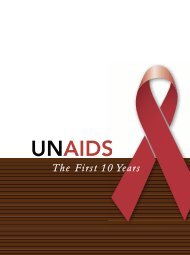Integration of HIV/AIDS activities with food and nutrition support in ...
Integration of HIV/AIDS activities with food and nutrition support in ...
Integration of HIV/AIDS activities with food and nutrition support in ...
Create successful ePaper yourself
Turn your PDF publications into a flip-book with our unique Google optimized e-Paper software.
Refugee participants enrolled <strong>in</strong> an antiretroviral therapy (ART) programme<br />
may be poor <strong>and</strong> <strong>food</strong>-<strong>in</strong>secure, <strong>and</strong> unable to consume a nutritious diet,<br />
especially if they are not receiv<strong>in</strong>g a full ration. Refugees enrolled <strong>in</strong> a home-based care<br />
programme may already be receiv<strong>in</strong>g a supplementary ration (see <strong>in</strong>tegrated programme<br />
strategies 6 <strong>and</strong> 15). If they are not enrolled <strong>in</strong> a home-based care programme<br />
but are regularly tak<strong>in</strong>g ART, a supplementary ration comb<strong>in</strong>ed<br />
<strong>with</strong> <strong>nutrition</strong> education may <strong>in</strong>crease the effectiveness <strong>of</strong> the treatment.<br />
What does this <strong>in</strong>tegrated programme strategy aim to achieve?<br />
Provision <strong>of</strong> a supplementary ration to PLWHA tak<strong>in</strong>g antiretroviral therapy aims to<br />
<strong>in</strong>crease the effectiveness <strong>of</strong> the treatment <strong>in</strong> suppress<strong>in</strong>g the virus <strong>and</strong> promot<strong>in</strong>g disease-free<br />
survival, by boost<strong>in</strong>g the ill person’s strength, <strong>nutrition</strong>al status <strong>and</strong> overall<br />
health <strong>and</strong> immune function. In addition, a number <strong>of</strong> antiretroviral drugs must be taken<br />
<strong>with</strong> <strong>food</strong>. Common side-effects <strong>in</strong>clude nausea, vomit<strong>in</strong>g, diarrhoea <strong>and</strong> appetite suppression.<br />
Antiwast<strong>in</strong>g medications must be accompanied by <strong>in</strong>creased energy <strong>in</strong>take. Inability to<br />
consume a proper diet while on ART can lead to pa<strong>in</strong>ful side-effects, reduce the medications’<br />
efficacy, <strong>and</strong> promote drug resistance.<br />
How would this <strong>in</strong>tegrated programme strategy be implemented?<br />
Institutional collaboration <strong>and</strong> coord<strong>in</strong>ation. Health staff must collaborate <strong>with</strong> <strong>food</strong> distribution<br />
staff <strong>and</strong> government to develop protocols for supplementary feed<strong>in</strong>g <strong>with</strong> ART. Options<br />
be<strong>in</strong>g considered by the <strong>in</strong>ternational community <strong>in</strong>clude supplementary tablets, bulk<br />
commodities, prepared <strong>food</strong>s (e.g., biscuits or formula). Factors to consider <strong>in</strong> the decision<br />
<strong>in</strong>clude cost, likely adherence by participants <strong>and</strong> <strong>in</strong>trahousehold shar<strong>in</strong>g.<br />
Emphasis on participatory <strong>and</strong> community-led approaches. Refugee communities may have<br />
traditional beliefs about which <strong>food</strong>s an ill person should eat, <strong>and</strong> such beliefs may <strong>in</strong>fluence<br />
how <strong>nutrition</strong>al supplements are perceived. Congolese refugees <strong>in</strong> Zambia <strong>and</strong> Ug<strong>and</strong>a accurately<br />
identified <strong>food</strong>s rich <strong>in</strong> prote<strong>in</strong> <strong>and</strong> micronutrients (e.g., eggs, fish, fresh fruits <strong>and</strong> vegetables)<br />
as those they give to friends <strong>and</strong> family who are ill. Nutritional <strong>support</strong> should identify<br />
<strong>and</strong> re<strong>in</strong>force positive traditional practices about <strong>nutrition</strong> dur<strong>in</strong>g illness.<br />
Logistics <strong>of</strong> implementation. PLWHA tak<strong>in</strong>g ART should ideally be enrolled <strong>in</strong> a home-based<br />
care programme. Additional research is needed to determ<strong>in</strong>e the <strong>nutrition</strong>al requirements associated<br />
<strong>with</strong> each antiretroviral drug regimen. Provision <strong>of</strong> supplementary rations to people on ART<br />
requires an extremely stable supply <strong>of</strong> <strong>food</strong> aid commodities, as any breaks could affect patients’<br />
health <strong>and</strong> may risk promot<strong>in</strong>g drug resistance if adherence to the treatment protocol is disrupted.<br />
Although research is cont<strong>in</strong>u<strong>in</strong>g to determ<strong>in</strong>e for how long supplementary <strong>food</strong> <strong>support</strong> may be<br />
necessary, many programmes currently be<strong>in</strong>g implemented are suggest<strong>in</strong>g at least six months.<br />
82<br />
Integrated Programme Strategy 16:<br />
<strong>Integration</strong> <strong>of</strong> a supplementary ration <strong>and</strong> <strong>nutrition</strong> education<br />
<strong>in</strong>to an antiretroviral therapy programme

















